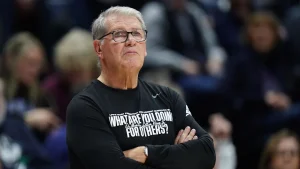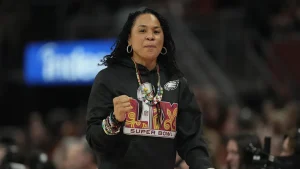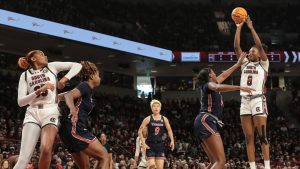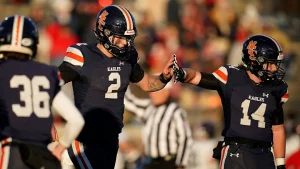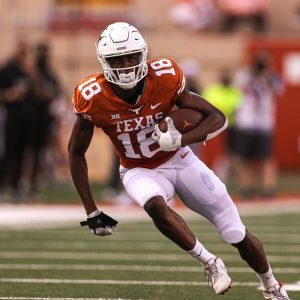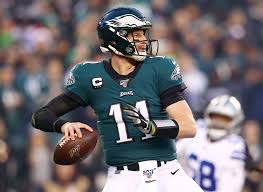
In 2022, the Eagles defense was unable to stop Mahomes. According to The Athletic, they exacted their retribution in Super Bowl 59.
The Eagles’ Redemption: How Philadelphia’s Defense Finally Stopped Mahomes in Super Bowl 59
In Super Bowl 57, the Philadelphia Eagles’ defense faltered under the weight of the Chiefs’ star quarterback, Patrick Mahomes. Despite a strong performance from their offense, the Eagles were unable to halt Mahomes, leading to a heart-wrenching 38-35 loss. But just two years later, in Super Bowl 59, Philadelphia exacted their revenge in dramatic fashion. This time, it was their defense that stepped up to the plate, stifling Mahomes and the high-flying Kansas City offense in one of the most dominant defensive performances in recent memory.
The road to redemption for the Eagles wasn’t easy, and it wasn’t an accident. Their Super Bowl 59 victory was built upon strategic adjustments, a commitment to defense, and new leadership that brought the necessary changes to neutralize Mahomes. From defensive scheme changes to key individual performances, every piece of the puzzle came together to help the Eagles secure a 40-22 win, stopping Mahomes in his tracks and denying the Chiefs a potential three-peat.
Super Bowl 57: The Painful Lessons of Failure
To understand the magnitude of the Eagles’ defensive performance in Super Bowl 59, it’s important to first look back at their defeat in Super Bowl 57. Despite holding a 10-point lead in the third quarter, the Eagles’ defense struggled to contain Mahomes, who orchestrated a memorable comeback. The game was ultimately decided by a series of big plays from Mahomes, including crucial passes to Travis Kelce and a last-minute field goal that handed the Chiefs their second Super Bowl in four years.
Philadelphia’s defense, ranked highly throughout the regular season, was unable to stop Mahomes from extending plays and executing deep passes. While the Eagles managed to sack Mahomes three times in the first half, they were unable to capitalize on those opportunities, and Mahomes exploited their defense with his improvisational skills. The Chiefs capitalized on mismatches, particularly in the secondary, and the Eagles were unable to generate enough pressure when it mattered most.
This loss weighed heavily on the team. The Eagles knew they had the talent to compete, but they lacked the right defensive game plan to slow down one of the league’s most dynamic quarterbacks.
Offseason Changes: A Defensive Overhaul
In the offseason following their loss in Super Bowl 57, the Eagles’ front office, led by general manager Howie Roseman, made it a priority to address the weaknesses in their defense. While the defensive line was one of the most productive in the NFL, they needed more from their secondary, as well as a more structured defensive game plan against elite quarterbacks like Mahomes.
One of the most pivotal moves came in January 2024, when the Eagles hired Vic Fangio as their new defensive coordinator. Fangio, known for his expertise in developing complex defensive schemes, was tasked with reworking the Eagles’ defensive strategy to better contain high-powered offenses like Kansas City. He was brought in to be the architect of a defense that could not only pressure the quarterback but also make critical adjustments to prevent explosive plays.
Fangio’s appointment marked a shift in how the Eagles would approach Super Bowl 59. Instead of relying solely on their pass rush, they would employ a more disciplined and nuanced approach that would involve a variety of coverages and defensive rotations to throw off Mahomes’ timing.
The Defensive Scheme: Two-High Safety and Pressuring Mahomes
Fangio implemented a modified version of his signature defensive scheme, focusing on a two-high safety look that became the foundation of the Eagles’ defense in Super Bowl 59. The strategy was simple yet effective: the two-high safety alignment would limit Mahomes’ ability to exploit deep routes, forcing him to make precise throws underneath or in the intermediate range.
By using two safeties deep, the Eagles were able to keep a lid on the explosive passing attack that had torched their defense in Super Bowl 57. This coverage scheme required both safeties to be disciplined, ensuring that they didn’t bite on play action or leave receivers open down the field. The idea was to force Mahomes into longer, methodical drives while limiting his ability to make the spectacular, off-script throws that had defined his career.
But the two-high safety scheme wasn’t the only adjustment the Eagles made. They also focused on pressuring Mahomes with their front four, relying less on exotic blitzes and more on traditional pass-rushing techniques. This allowed the secondary to stay in coverage longer, without the added stress of blitzers leaving open gaps. The front four had the talent to generate pressure, with standout performers like Josh Sweat, Fletcher Cox, and Jordan Davis leading the charge.
Individual Performances: Key Contributions from Eagles’ Defense
While the scheme was important, it was the individual performances that made all the difference in Super Bowl 59. Several key players stepped up to deliver a performance that was both clinical and suffocating.
Josh Sweat was one of the most impactful players on the field. Known for his speed and strength, Sweat had an outstanding game, recording 2.5 sacks and consistently getting in Mahomes’ face. Sweat’s relentless pursuit disrupted Mahomes’ timing and forced him to scramble, something that would prove to be a hallmark of the game. His ability to collapse the pocket and get to the quarterback was a key part of why Mahomes was unable to get comfortable.
Cooper DeJean, a rookie cornerback who had impressed throughout the season, had a breakout game. DeJean made an immediate impact with two interceptions, including a 38-yard pick-six that gave the Eagles a commanding 24-0 lead at halftime. His ability to read Mahomes’ eyes and anticipate throws was evident, and his pick-six was a game-changing moment. The interception returned for a touchdown not only took points off the board for the Chiefs but also gave the Eagles a significant emotional lift.
In addition to Sweat and DeJean, Zack Baun, another key linebacker for the Eagles, played a pivotal role. Baun made several crucial tackles and was in the right place at the right time when he picked off a Mahomes pass that led to a touchdown. His interception highlighted the discipline and focus that the Eagles’ defense displayed throughout the game, as they forced Mahomes into mistakes when he tried to force the ball into tight windows.
The Game-Changing Moments: Eagles Dominate Early and Maintain Control
From the opening whistle, it was clear that the Eagles had come prepared to make a statement. Their defense suffocated Mahomes and the Chiefs’ offense in the first half, leading 24-0 at halftime. The Chiefs were unable to get any traction on offense, as Mahomes struggled to find open receivers. The relentless pressure from the Eagles’ defensive line and the disciplined coverage in the secondary made it nearly impossible for Mahomes to connect with his weapons.
In the second half, the Chiefs tried to mount a comeback, but it was the Eagles’ defense that once again thwarted their efforts. Despite Mahomes making a few key throws, the Eagles’ defense was unyielding. The Eagles’ front four continued to dominate, sacking Mahomes six times throughout the game. The secondary also came up with key stops, including DeJean’s second interception, which snuffed out any hope of a Chiefs’ rally.
A Defense That Made History
The Eagles’ defense in Super Bowl 59 was a testament to the power of coaching, preparation, and talent. Through a combination of smart adjustments, a disciplined game plan, and outstanding individual performances, the Eagles were able to exact their revenge on Mahomes and the Chiefs. This victory marked the Eagles’ second Super Bowl win in franchise history, but more importantly, it demonstrated how defense could win championships—especially against one of the greatest quarterbacks to ever play the game.
By denying Mahomes and the Chiefs an opportunity for a third straight Super Bowl title, the Eagles solidified their place as one of the most complete teams in the NFL. Their performance in Super Bowl 59 will go down as one of the most dominant defensive efforts in Super Bowl history, and it sent a message to the league: the Eagles’ defense was not to be underestimated.
